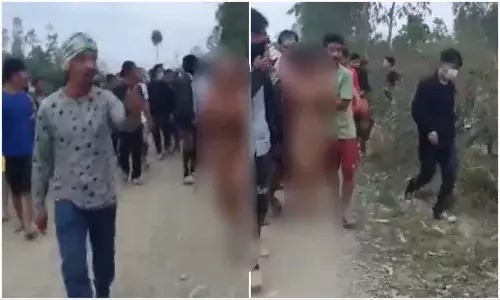In the picturesque landscapes of India’s northeastern Manipur state, a grim tableau unfolds. Four men kneel in a makeshift bunker, their eyes locked on a rival fortification barely a mile away. Homemade bulletproof vests adorn their bodies, while aging shotguns, some single and others double-barreled, rest within arm’s reach. The guns are trained on the horizon, a chilling testament to the ethnic conflict that has engulfed Manipur says BBC Report.
A Cycle of Violence Unleashed
Manipur, a state in India’s northeast, has become the backdrop for a horrific tale of brutality and despair. A shocking wave of violence between the majority Meitei community, predominantly Hindu, and minority Kuki groups has left over 200 people dead. Among the victims, nearly two-thirds belong to the Kuki community, an umbrella term for the Kuki, Zomi, Chin, Hmar, and Mizo tribes, the majority of whom are Christians.
The catalyst for this terrifying conflict can be traced back to May 4th, when two Kuki-Zomi women were subjected to a horrifying ordeal. A mob of Meitei men stripped the women naked, with the younger one allegedly subjected to gangrape. Tragically, her father and 19-year-old brother paid the ultimate price, beaten to death before her eyes.
The pain of this tragedy lingers, as evidenced by the heartbreaking testimony of the mother of the victims, whose identity remains shielded due to Indian laws protecting rape victims. With tears in her eyes, she recounts the horrors inflicted upon her family: “To see how my daughter was treated, after my husband and son were killed, it made me want to die. My husband was a church elder. He was soft-spoken and kind. His arms were slashed with knives. My son was in the 12th grade, a gentle boy who never fought with anyone. He was brutally beaten with rods. He was killed because he ran after them [the mob] to try to save his sister. My daughter has not recovered. They were killed in front of her.”
Despite a police complaint being lodged in May, it wasn’t until a video of the incident surfaced on social media in July that the Manipur conflict garnered national and international attention. Accounts of how the violence ignited vary, with the Meitei community residing primarily in the prosperous Imphal valley and the rest of the state occupied by underdeveloped hill areas, home to minority groups, including the Kukis.
A Land Dispute Ignites Tensions
At the heart of the dispute lies a contentious issue: land rights. The Kukis, granted tribal status, enjoy the privilege of purchasing land anywhere in Manipur. In stark contrast, the Meiteis, confined to the Imphal valley, are prohibited from acquiring land in the hills. On May 3rd, Kuki tribes took to the streets to protest against the proposed tribal status for the Meiteis, an act that Kukis claim triggered orchestrated attacks by hardline Meitei groups against minority families in Imphal and its surroundings.
The ensuing violence claimed numerous lives, reducing homes to ashes and laying waste to places of worship. Approximately 60,000 individuals from both communities now find themselves displaced, taking refuge in schools, sports facilities, and makeshift shelters, unable to return to their homes.
A Militarized Divide
The physical separation between the Meiteis and Kukis is starkly evident, marked by a labyrinth of police and army checkpoints along the 60-kilometer route from Imphal to Churachandpur. Civilians, brazenly brandishing weapons, including minors, walk freely on both sides of the de facto borders, underscoring the absence of government control in the region.
The grim reality is that both communities feel betrayed by the institutions meant to protect them. Meiteis allege that the Assam Rifles, a counter-insurgency force under the Indian national government, is siding with the Kukis, while Kukis accuse Manipur police of supporting violence against them.
The conflict in Manipur remains volatile, with sporadic instances of violence continuing to erupt. The lack of dialogue between the two sides and the inability of the police to access Kuki areas only exacerbate the crisis. Amidst this turmoil, innocent lives continue to hang in the balance, and the hope for a peaceful resolution dims with each passing day.
The Manipur state government, led by Chief Minister N. Biren Singh, has yet to provide a comprehensive response to the crisis. Both communities express disappointment with the national government’s handling of the situation, with many questioning why Manipur seems to be neglected.
As the world watches, Manipur remains ensnared in a cycle of violence and mistrust, with the lives of its innocent citizens hanging in the balance. Prime Minister Modi’s assertion that “peace is slowly returning to Manipur” is yet to find tangible evidence on the ground, as Manipur remains a crucible of simmering tensions, armed civilians, and a precarious peace.

